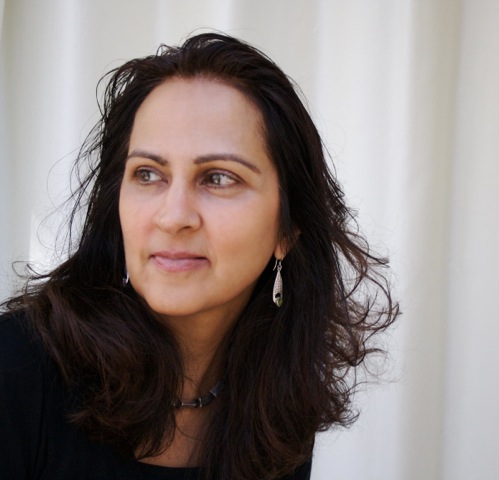Zarqa Nawaz has carved a career out of ‘writing the funny.’ She created hit show, Little Mosque on the Prairie, the first of its kind to put Muslims on Canadian TV. Her memoir, Laughing All the Way to the Mosque, published last month, captures the realities and absurdities of life for a practicing Muslim woman living in the West.
I catch up with Nawaz one early evening, just gone six pm. I’ve been chasing her on Twitter for weeks, almost giving up, before getting a message to say she’ll be in town until Monday. She’s at the end of her publicity tour.
It’s difficult to read a memoir and not form an impression of its author. So I feel like I know Nawaz already. I know her spirit. She’s kind and funny. Honest. And a little silly, too. I get the impression she falls into things, landing on her feet. Like the time she agreed to cook the Eid feast for the entire community to look good, hoping her mother in law would insist on doing it all by herself (apart from success with the Rice Krispies Squares, Nawaz isn’t a seasoned cook). Everything turned out okay – in the end.
Her memoir is filled with ordinary stories like this, of her attempts to flirt when trying to find a husband, of landing a spot in journalism school after failing med school, of being barred from the dead body washing committee for being inappropriate. There’s nothing about her life that’s too horrific, too torturous or tragic that is often the impetus for writing a memoir. She’s not a celebrity, as such. Nawaz claims she had a ‘surburban, boring upbringing’ but it’s out of this ordinariness, this feeling of familiarity, of knowing someone like her, or even of being her that makes Laughing All the Way to the Mosque a compelling read.
Muslim readers will nod along in conspiratorial sisterhood in ‘having been there, done that’ while non-Muslims will get a sense of what life is really like for Muslims in the West, away from the sensationalist headlines that have become commonplace.
‘I think it’s affected people in different ways.’ Nawaz says. ‘I was just writing it and the person editing it was my non-Muslim editor so she would probably emphasise certain things and would want to hear more about certain things. She was my only audience.’
I suggest to Nawaz that her editor probably helped to draw out things about her otherwise ‘ordinary’ story that weren’t necessarily interesting to her which may have helped achieve this balance. ‘Or things that I thought were utterly fascinating she didn’t care about,’ she laughs, ‘Which was more upsetting for me. I was like this is so important and she was like, not really.’
We talk at length of her admiration for Imran Ahmad who chronicles his own story in Unimagined: A Muslim boy meets the West. Nawaz says she was reading it at the time of writing, and was struck at how amazing it was, worried that she wouldn’t be able to write something as good.
But Nawaz’s telling-it-like-it-is approach has paid off. The reception to her book has been remarkably positive. ‘I know it’s embarrassing to say, but I didn’t expect it to be as good as it was. Because you’re so close to the book, you have no idea how it will be perceived by people.’
Despite the often haphazard, sometimes inappropriate, I get the feeling that Nawaz is someone who really gets it. Her voice is refreshing and important. There’s a point to her comedy and she’s unafraid to call out the absurdity of her world which includes everyone (the West, the Muslim community, her family) and herself. ‘I think finding the truth in absurdity is at the heart of making people laugh.’
I ask her what she’s learnt about herself and others through her work. ‘I think the only way we’re going to overcome fear is through understanding, communication and constant engagement and that you can never give up. That it’s too easy to say it’s too much or it’s not worth it. You have to constantly fight that urge.’
We move on to talk about the writing process. Nawaz doesn’t seem like the kind of person who could sit still, let alone write for hours on end. So how did she cope? Did she sit in her jammies all day and eat nothing but ice-cream?
‘If you talk to my son, he would say yes. He would say, all she does all day long is shop online in her pyjamas. All she’s doing is shopping for a dress to wear to her book launch,’ she laughs. Nawaz says she was working with a draconian editor who wanted to have the book out for the summer, so she had to finish it in January. It was a short turnaround and she thought she had done well to finish the book on time only to discover she was thirty thousand words short.
As it turned out, Nawaz was working by page number, not word count. Her editor demanded that she write the short fall within the deadline, only a month a way. Nawaz says she survived this ‘insane period’ by employing a system that rewarded her for every hundred words she wrote.
‘I would write 100 words and then I would allow myself to surf for ten minutes.’ She would do this over and over until she’d reached a thousand words. It’s a system that worked for Nawaz but one that she doesn’t recommend. She ended up injuring her hand and suffering from repetitive strain injury. She plans to write another book at some point, a novel ‘something that suits my sensibilities.’
I ask her for tips. How can writers inject humour into their work? How do they know they’re on to a good idea? But Nawaz says she can’t explain why it works. ‘If I were to deconstruct it I would jinx the ability to do it.’ She says it’s better to just give it a try and see if it’s funny and not to let others judge your work. ‘Don’t give it to your children, because they will kill you with their criticism.’ Her children, have been her hardest critics. ‘They read the book and found it unremarkable. They said it wasn’t funny and it’s not very good.’ Nawaz does however, have a talent for making audiences laugh. She’s built a career out of it. It’s what she knows best.
Zarqa Nawaz’s recipe for Rice Krispies Squares
A jar of marshmallow fluff
2/3 cups of Rice Krispies
Mix the two together.

